Filter by
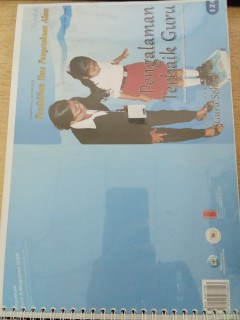
Pengalaman Terbaik Guru
Buku Pengalaman Terbaik Guru memuat kisah-kisah inspiratif dari para pendidik yang membagikan pengalaman berharga selama menjalankan tugas sebagai guru. Setiap cerita mencerminkan tantangan, keberhasilan, dan pembelajaran yang mereka alami dalam proses mendidik, membimbing, dan membentuk karakter siswa.
- Edition
- Volume X No 124
- ISBN/ISSN
- 0125-9784
- Collation
- 29 cm x 21 cm
- Series Title
- Volume X No 124/Mei 2010
- Call Number
- 371.1 GUR

PETUNJUK TEKNIS (Program Pengembangan Keprofesian Berkelanjutan)
Pedoman ini menyajikan instrumen teknis pelaksanaan Program PKB melalui pendekatan zonasi guna meningkatkan mutu pembelajaran di Indonesia. Tujuan utamanya adalah mendukung kualitas proses belajar mengajar melalui Program PKP yang berorientasi pada keterampilan berpikir tingkat tinggi (HOTS), serta pemerataan mutu pendidikan secara regional. Strategi zonasi diterapkan melalui pengelolaan lembag…
- Edition
- -
- ISBN/ISSN
- -
- Collation
- 29cm X 20,5cm
- Series Title
- Pedoman
- Call Number
- 375.001PET
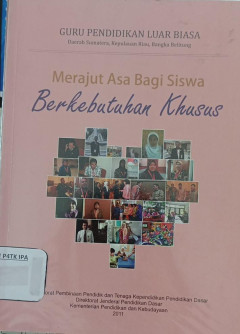
Merajut Asa Bagi Siswa Berkebutuhan Khusus
- Edition
- -
- ISBN/ISSN
- -
- Collation
- 73 hal
- Series Title
- -
- Call Number
- 371.9 DIR
- Edition
- -
- ISBN/ISSN
- -
- Collation
- 73 hal
- Series Title
- -
- Call Number
- 371.9 DIR

Pedoman Modis Pisan (Mobil Pendidikan Semua Pintar Sains)
- Edition
- -
- ISBN/ISSN
- -
- Collation
- 29cm X 21cm
- Series Title
- Pedoman
- Call Number
- 371.2PED
- Edition
- -
- ISBN/ISSN
- -
- Collation
- 29cm X 21cm
- Series Title
- Pedoman
- Call Number
- 371.2PED

Petunjuk Teknis Modis Pisan (Mobil Pendidikan Semua Pintar Sains)
- Edition
- -
- ISBN/ISSN
- -
- Collation
- 29cm X 21cm
- Series Title
- Pedoman
- Call Number
- 370.19PET
- Edition
- -
- ISBN/ISSN
- -
- Collation
- 29cm X 21cm
- Series Title
- Pedoman
- Call Number
- 370.19PET

Laporan Pelaksanaan Kegiatan Modis Pisan (Mobil Pendidikan Semua Pintar Sains)
- Edition
- -
- ISBN/ISSN
- -
- Collation
- 29cm X 21cm
- Series Title
- Pedoman
- Call Number
- 370LAP
- Edition
- -
- ISBN/ISSN
- -
- Collation
- 29cm X 21cm
- Series Title
- Pedoman
- Call Number
- 370LAP

Progress Report 2009-2010 SEAMEO Regional Centre Qitep In Science
Laporan ini mencakup kegiatan dan pencapaian SEAMEO QITEP in Science selama periode 2009–2010, dengan fokus pada peningkatan kompetensi tenaga pendidikan sains di kawasan Asia Tenggara. Materi yang dilaporkan meliputi pelatihan guru IPA berbasis inquiry‑based science education (IBSE), pengembangan perangkat pembelajaran sains, kolaborasi regional antar negara anggota SEAMEO, serta penelitia…
- Edition
- -
- ISBN/ISSN
- -
- Collation
- 29 cm x 21 cm
- Series Title
- Pedoman
- Call Number
- 371.334

Pedoman Pemilihan Widyaiswara Berprestasi Di Lingkungan Kementrian Pendidikan…
Pedoman ini disusun sebagai acuan dalam menyelenggarakan pemilihan widyaiswara berprestasi di lingkungan Kementerian Pendidikan dan Kebudayaan. Tujuannya adalah mendorong peningkatan kualitas, motivasi, dan profesionalisme widyaiswara melalui penilaian berbasis kinerja dan prestasi.
- Edition
- -
- ISBN/ISSN
- -
- Collation
- 29 cm x 21 cm
- Series Title
- -
- Call Number
- 371.144

Rekomendasi Workshop Integrasi STEM dalam Implwmwntasi Kurikulum 2013
Dokumen ini disusun sebagai panduan pelaksanaan workshop yang bertujuan untuk meningkatkan kompetensi guru dalam mengintegrasikan pendekatan STEM (Science, Technology, Engineering, and Mathematics) ke dalam pembelajaran berbasis Kurikulum 2013
- Edition
- -
- ISBN/ISSN
- -
- Collation
- 29 cm x 21 cm
- Series Title
- -
- Call Number
- 371.144

How Computers Entered The Classroom, 1960-2000 Historical Persperctives
This open‑access edited volume addresses a major gap in the history of education by tracing how computers were introduced into European classrooms between 1960–2000. Through ten case studies and thematic chapters, it examines the roles of key actors—politicians, industry, teachers, and students—as well as the impact of political rationales, ideologies, and organizational structures.
- Edition
- Volume 2
- ISBN/ISSN
- 978-3-11-078014-7
- Collation
- 247 page
- Series Title
- -
- Call Number
- 371.334094
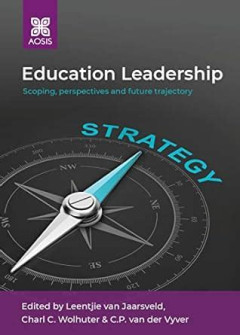
Education Leadership
Educational leadership has a demonstrable and significant impact on school success and student achievement. This volume captures the breadth of scholarship in educational leadership through diverse research contributions focusing on teacher leadership, school leadership, and mid‑level roles.
- Edition
- -
- ISBN/ISSN
- 978-1-77995-223-3
- Collation
- 266 page
- Series Title
- -
- Call Number
- 371.2
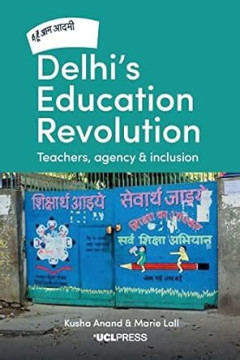
Delhi's Education Revolution Teachers, Agency & Inclusion
- Edition
- -
- ISBN/ISSN
- -
- Collation
- 211 page
- Series Title
- -
- Call Number
- 371.26
- Edition
- -
- ISBN/ISSN
- -
- Collation
- 211 page
- Series Title
- -
- Call Number
- 371.26

Transforming University-Based Teacher Education Through Innovation
This edited volume, based on a decade of innovation driven by Norway’s ProTed (Centre for Professional Learning in Teacher Education), maps the future of university-based teacher education. It synthesizes cutting‑edge practices and empirical findings aimed at transforming teacher training programmes. Key themes include: integrated programme design for coherence across years; building univer…
- Edition
- -
- ISBN/ISSN
- 978-1-032-66789-8
- Collation
- 263 page
- Series Title
- -
- Call Number
- 374.2

Changing Higher Education For A Changing World
Drawing on research from the Centre for Global Higher Education (CGHE)—the world’s largest social science research centre focused on higher education—this open access volume (published December 2023 / early 2022) critically examines how global higher education systems are changing.
- Edition
- -
- ISBN/ISSN
- 978-1-3501-0842-4
- Collation
- 289 page
- Series Title
- -
- Call Number
- 378.23
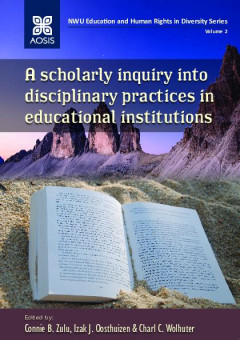
A scholarly inquiry into disciplinary practices in educational institutions
This edited volume presents original research on discipline and disciplinary practices in various educational institutions—from schools to tertiary settings. It offers a scientific and scholarly perspective by integrating empirical and philosophical approaches—quantitative (positivist), qualitative (interpretive), and mixed methods (pragmatic)—to investigate discipline issues in contexts …
- Edition
- Volume 2
- ISBN/ISSN
- 978-1-928523-15-4
- Collation
- 362 page
- Series Title
- -
- Call Number
- 370.15
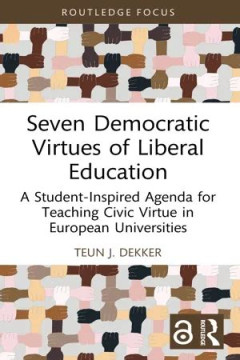
Seven Democratic Virtues of Liberal Education
This book argues that the Liberal Arts and Sciences (LAS) model of education can inspire reform across higher education to help students acquire crucial civic virtues. Based on interviews with 59 students from LAS programmes across Europe, it demonstrates how LAS education cultivates essential citizenship skills for democratic engagement. From these insights, Dekker identifies seven key democra…
- Edition
- -
- ISBN/ISSN
- 978-1-032-36921-1
- Collation
- 134 page
- Series Title
- -
- Call Number
- 370.115

Brian Simon and the Struggle for Education
This pioneering biography examines the life and career of Brian Simon (1915–2002), a prominent Marxist intellectual and historian of education in 20th-century Britain. Drawing on newly available archives, it explores his diverse roles—as student, soldier, schoolteacher, Communist Party activist, academic, and reformer—and closely analyzes how his Marxist convictions shaped his contributio…
- Edition
- -
- ISBN/ISSN
- 978-1-78735-983-3
- Collation
- 206 page
- Series Title
- -
- Call Number
- 370.92
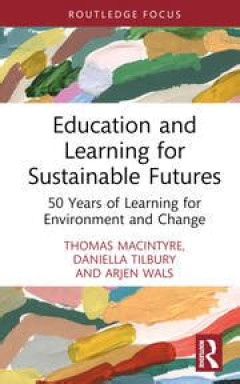
Educating and Learning for Sustainable Futures
This volume critically traces the evolution of environmental and sustainability education over the past five decades. Beginning with the 1972 UN Conference on the Human Environment and moving through to the 2020s, it examines how educational approaches—shaped by global events and sustainability discourses—have succeeded or fallen short in effecting meaningful change. Through historical and …
- Edition
- -
- ISBN/ISSN
- 978-1-032-72791-2
- Collation
- 135 page
- Series Title
- -
- Call Number
- 363.7007
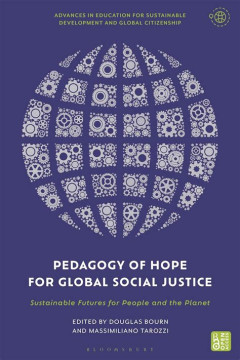
Pedagogy of Hope For Global Social Justice
Following Paulo Freire’s “pedagogy of hope,” this open-access volume explores hope as an educational approach to addressing global challenges—such as climate change, racism, and the COVID‑19 pandemic. It presents a conceptual framework for global citizenship and environmental education, authored by scholars across 12 countries. Case studies range from teacher training in Latin America…
- Edition
- -
- ISBN/ISSN
- 978-1-3503-2628-6
- Collation
- 289 page
- Series Title
- -
- Call Number
- 370.115

Partnership Between Universities in Japan and South Africa
Cross-border partnerships are increasingly important in twenty-first-century higher education. Despite many universities pursuing international collaborations, there has been no comprehensive synthesis of models and case studies to guide such efforts. This book addresses that gap by presenting diverse partnerships between Japanese and South African universities. Through multiple case studies, i…
- Edition
- -
- ISBN/ISSN
- 978-1-7764893-5-0
- Collation
- 280 page
- Series Title
- -
- Call Number
- 378.19

Joint Modules and Internationalisation in Higher Education
This volume examines the development of the Joint Module "Comparative Studies in Adult Education and Lifelong Learning" (COMPALL) within the context of international trends in higher education and adult education. It discusses the module's institutional and didactical structures, as well as the motivations and diversity of its participants. The book is divided into three parts: (1) Internationa…
- Edition
- Volume 71
- ISBN/ISSN
- 978-3-631-73641-8
- Collation
- 204 page
- Series Title
- -
- Call Number
- 370.948

Theorising Research, Innovation and Internationalisation in African Higher Ed…
This book delves into the evolving landscape of African higher education, examining the complex interplay between research, innovation, and internationalisation. It addresses the challenges and opportunities shaped by colonial legacies, globalisation, decolonisation, and the COVID-19 pandemic. The volume highlights the significant contributions of African scholars to global higher education and…
- Edition
- -
- ISBN/ISSN
- 978-1-7764474-5-9
- Collation
- 402 page
- Series Title
- -
- Call Number
- 370.967

Raising The Impact Of Education Research In Africa
his scholarly volume addresses the low demonstrable effect of education research in South Africa and Africa, focusing on recommendations from scholars in various educational sub-fields. It revisits the history of research outcomes and offers informed recommendations based on in-depth investigations and analyses. The book aims to stimulate scholarly discussion on increasing the recording of the …
- Edition
- -
- ISBN/ISSN
- 978-1-928396-80-2
- Collation
- 442 page
- Series Title
- -
- Call Number
- 370.967
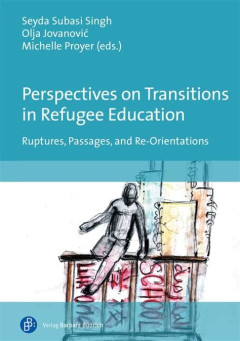
Perspectives on Transitions in Refugee Education
This open-access volume examines the multifaceted transitions refugees encounter—individual, social, and cultural—and their intersections with educational experiences. Drawing on studies from diverse national contexts, the book explores the complex relationships between individuals, culture, society, and institutions. By analyzing these transitional processes, the work aims to deepen unders…
- Edition
- -
- ISBN/ISSN
- 978-3-8474-1786-6
- Collation
- 266 page
- Series Title
- -
- Call Number
- 371.9

Self-Directed Learning Curriculum implementation, praxis and scholarship in …
This open-access scholarly volume offers an in-depth analysis of self-directed learning (SDL) across curriculum design, teaching practice, and academic research. Drawing on a wide range of original studies, it highlights how SDL can be strategically embedded in curricula to foster learners’ autonomy and readiness for 21st-century challenges. Grounded in constructivist, socio-constructivist, a…
- Edition
- -
- ISBN/ISSN
- 978-1-77995-325-4
- Collation
- 344 page
- Series Title
- -
- Call Number
- 370.3
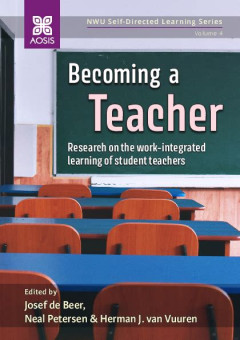
Becoming a Teacher
This book presents original research on learning through practical experience in pre-service teacher education. It reveals the student-teaching practicum—also known as work-integrated learning (WIL)—as the pivotal "elephant in the room," where theory meets real teaching environments
- Edition
- Volume 4
- ISBN/ISSN
- 978-1-928523-36-9
- Collation
- 472 page
- Series Title
- -
- Call Number
- 370.1
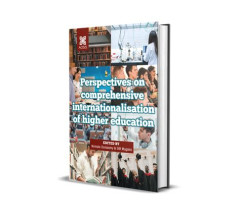
Perspectives on comprehensive internationalisation of higher education
This open‑access volume argues that internationalisation in higher education must be competitive, sustainable, and contribute meaningfully to both local and global educational development. It explores how higher education institutions (HEIs) balance economic imperatives—such as rankings, revenue from international student enrolment, and recruitment of top researchers—with educational goal…
- Edition
- -
- ISBN/ISSN
- 978-1-77995-211-0
- Collation
- 326 page
- Series Title
- -
- Call Number
- 371
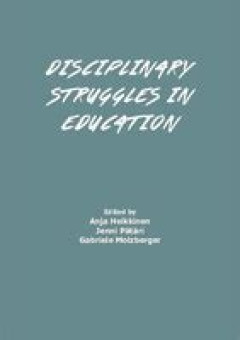
DISCIPLINARY STRUGGLES IN EDUCATION
This edited volume examines "disciplinary struggles" in education through three intertwined perspectives. The first section explores how educational practices and institutions are inherently disciplinary in nature.
- Edition
- -
- ISBN/ISSN
- 978-952-359-002-1
- Collation
- 264 page
- Series Title
- -
- Call Number
- 370.1

Theorising Curriculum in Unsetting Times In African Higher Education
Curriculum lies at the core of education and higher learning, yet its study and practice grow more complex amid global challenges. This volume explores how African universities navigate curriculum in the context of COVID-19, calls for decolonisation, and the Fourth Industrial Revolution. Featuring contributions from leading scholars, it examines the tensions between traditional, Eurocentric edu…
- Edition
- -
- ISBN/ISSN
- 978-1-7764606-1-8
- Collation
- 350 page
- Series Title
- -
- Call Number
- 370.375
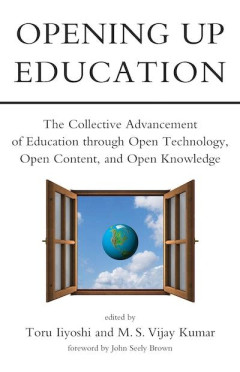
Opening Up Education
A collection of essays by leading experts explores how open education—encompassing open technology, content, and knowledge—can fundamentally shift the economics and dynamics of learning. Drawing on diverse initiatives—from courseware and simple games to open-source platforms—contributors highlight the untapped potential of shared educational resources. They call for not just technical i…
- Edition
- -
- ISBN/ISSN
- 978-0-262-03371-8
- Collation
- 500 page
- Series Title
- -
- Call Number
- 370
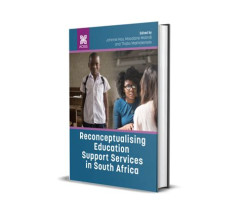
Reconceptualising Education Support Services in South Africa
Since inclusive education was introduced in South Africa in 2001, its success has depended on robust support services for both learners and teachers facing barriers. This book examines support systems at multiple levels—school-based teams, district-based teams, and special/full-service schools—highlighting their current fragmented implementation across the country.
- Edition
- -
- ISBN/ISSN
- 978-1-77634-205-1
- Collation
- 454 page
- Series Title
- -
- Call Number
- 371.2
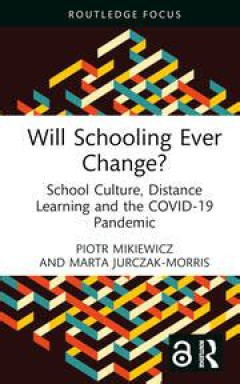
Will Schooling Ever Change?
This insightful meta‑narrative examines the global “natural experiment” of COVID‑19–induced distance education and explores its effects— or lack thereof—on school culture and traditional educational norms. Despite the massive shift to online teaching precipitated by the pandemic, the authors argue that core roles, relationships, and hierarchies between students and teachers in sch…
- Edition
- -
- ISBN/ISSN
- 978-1-003-36462-7
- Collation
- 116 page
- Series Title
- -
- Call Number
- 379
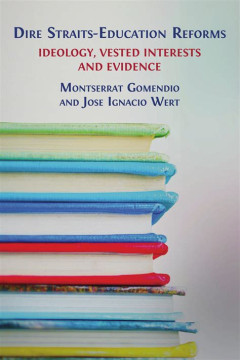
Dire StraitS-eDucation reformS
- Edition
- -
- ISBN/ISSN
- 978-1-80064-933-0
- Collation
- 364 page
- Series Title
- -
- Call Number
- 379
- Edition
- -
- ISBN/ISSN
- 978-1-80064-933-0
- Collation
- 364 page
- Series Title
- -
- Call Number
- 379
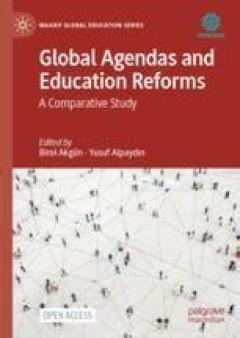
Global Agendas and Education Reforms
Global Agendas and Education Reforms: A Comparative Study analyzes how global education agendas—such as digitalization, entrepreneurship, emergency education, internationalization, diversity, and sustainability—shape national education reforms across various countries. It highlights convergence in policies and examines their impact on pedagogy, curriculum, teacher training, and administration
- Edition
- -
- ISBN/ISSN
- 978-981-97-3068-1
- Collation
- 292 Hal
- Series Title
- -
- Call Number
- 379.2
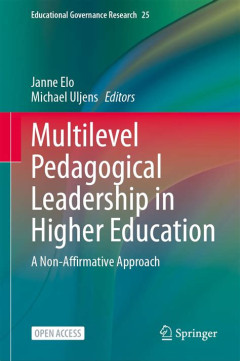
Multilevel Pedagogical Leadership in Higher Education
This open-access volume provides a solid theoretical foundation and empirical insight into the pedagogical dimensions of leadership in higher education. Framed by Non-Affirmative Theory (NAT), the book explores how educational leadership operates simultaneously across multiple levels—supranational/national policy, organizational structures, and interpretive interactional practices within clas…
- Edition
- -
- ISBN/ISSN
- 978-3-031-55116-1
- Collation
- 207 page
- Series Title
- -
- Call Number
- 379
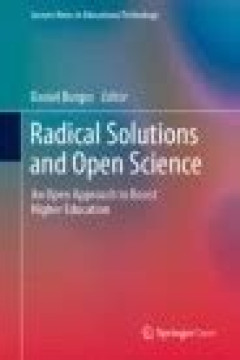
Radical Solutions and Open Science
This open-access book explores how Open Science practices can transform higher education, especially in response to global challenges such as the COVID-19 pandemic. It promotes a shift toward openness, collaboration, and transparency in research, education, and innovation. The contributors examine how open data, open access publishing, and citizen science can enhance the quality, relevance, and…
- Edition
- -
- ISBN/ISSN
- 978-981-15-4276-3
- Collation
- 199 page
- Series Title
- -
- Call Number
- 370.7
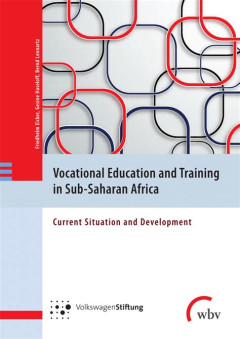
Vocational Education and Training in Sub-Saharan Africa
This book offers an in-depth analysis of Vocational Education and Training (VET) systems in Sub-Saharan Africa, exploring their current structures, challenges, and development potentials. It brings together case studies and research from various countries in the region, focusing on how VET can contribute to economic growth, employment, and poverty reduction. The volume highlights the diversity …
- Edition
- -
- ISBN/ISSN
- 978-3-7639-5793-4
- Collation
- 358 page
- Series Title
- -
- Call Number
- 375
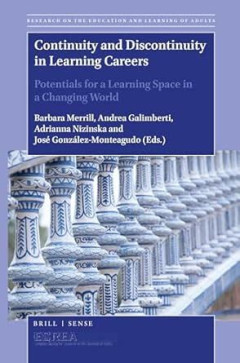
Continuity and Discontinuity in Learning Careers
This edited volume explores the learning trajectories and identities of non-traditional adult learners across varied educational settings, emphasizing both continuity and discontinuity in their learning careers. Based on European and international case studies, the book examines how social inequalities—including class, gender, ethnicity, age, and disability—both enable and constrain adults …
- Edition
- -
- ISBN/ISSN
- 978-90-04-37547-5
- Collation
- 215 page
- Series Title
- -
- Call Number
- 370.7
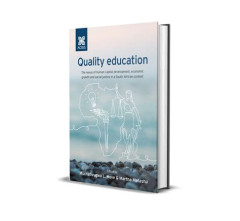
Quality Education
This open‑access volume, edited by Muchativugwa L. Hove and Martha Matashu, explores the complex interplay between education, social justice, gendered violence, and human rights within South African schools and universities. Drawing on rich and diverse classroom-based scholarship, the contributors examine how the “economies of education” and social justice imperatives shape the live…
- Edition
- -
- ISBN/ISSN
- 978-1-77634-193-1
- Collation
- 310 page
- Series Title
- -
- Call Number
- 379

Development, Education and Learning in Sri Lanka an International Research Jo…
This book presents a rich, longitudinal narrative spanning over 50 years of research into Sri Lanka’s education system. It highlights the nation’s early strengths in literacy and education—once viewed internationally as a development benchmark—and examines how these gains evolved amid political, economic, and social upheavals. Through collaborations with local researchers, educators, …
- Edition
- -
- ISBN/ISSN
- 978–1–80008–157–4
- Collation
- 410 page
- Series Title
- -
- Call Number
- 370
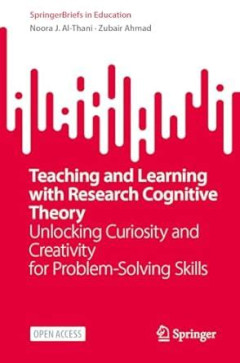
Teaching and Learning with Research Cognitive Theory
This open‑access volume by Noora J. Al‑Thani and Zubair Ahmad introduces Research Cognitive Theory (RCT) as a transformative approach across all educational levels. It emphasizes inquiry‑driven pedagogy to foster curiosity, creativity, innovation, and problem‑solving skills in students, while also supporting professional growth in teachers
- Edition
- -
- ISBN/ISSN
- 978-3-031-87544-1
- Collation
- 125 page
- Series Title
- -
- Call Number
- 370
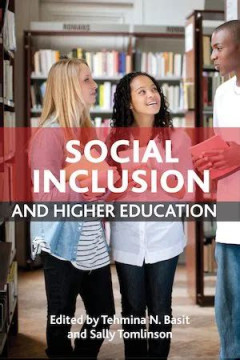
Social Inclusion and Higher Education
This open‑access volume, edited by Tehmina N. Basit and Sally Tomlinson, examines the experiences of students from non‑traditional backgrounds—including working-class, ethnic minority, mature students, and those with disabilities—once they enter higher education institutions across the UK, USA, and Australia. While much research has focused on access to university, this book fills…
- Edition
- -
- ISBN/ISSN
- 978 1 84742 797 7
- Collation
- 343 page
- Series Title
- -
- Call Number
- 378.1
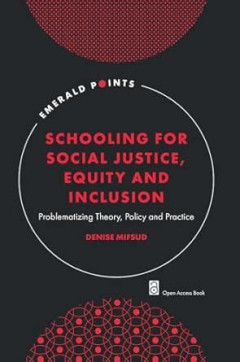
Schooling For Social Justice, Equity and Inclusion
This open-access volume critically examines the roles of social justice, equity, and inclusion in K–12 schooling, questioning the common assumption that schools can straightforwardly “solve” societal inequalities.
- Edition
- -
- ISBN/ISSN
- 978-1-83549-760-9
- Collation
- 139 page
- Series Title
- -
- Call Number
- 370.115
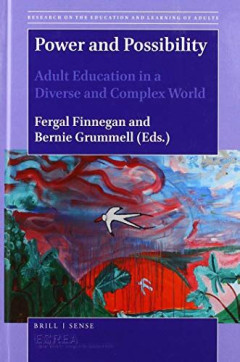
Power and Possibility Adult Education in a Diverse and Complex World
This open-access edited volume critically explores how power and possibility intersect within adult education across diverse, complex social landscapes. The collection presents theoretical, historical, and practical perspectives, examining how power operates in educational policy, programs, and practices. It highlights shifts in policy drivers, measurement regimes (e.g., PIAAC outcomes), and ex…
- Edition
- -
- ISBN/ISSN
- 978-90-04-41332-0
- Collation
- 200 page
- Series Title
- -
- Call Number
- 374
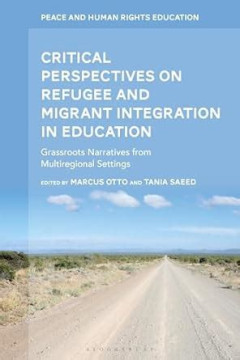
Critical Perspective on Refugee and Migrant Integration in Education
This open-access anthology critically explores how “integration” is conceptualized and enacted in educational contexts across diverse geopolitical and socio-cultural environments. Featuring chapters by scholars from Cyprus, Ethiopia, Germany, Mexico, Pakistan, the UK, and the US, it examines both conflict/post-conflict and non-conflict settings. Through grassroots narratives, the book highl…
- Edition
- -
- ISBN/ISSN
- 978-1-3504-5236-7
- Collation
- 229 page
- Series Title
- -
- Call Number
- 305.8

Education for Democratic Intercultural Citizenship
- Edition
- Volume 15
- ISBN/ISSN
- 978-90-04-41194-4
- Collation
- 202 page
- Series Title
- -
- Call Number
- 370
- Edition
- Volume 15
- ISBN/ISSN
- 978-90-04-41194-4
- Collation
- 202 page
- Series Title
- -
- Call Number
- 370
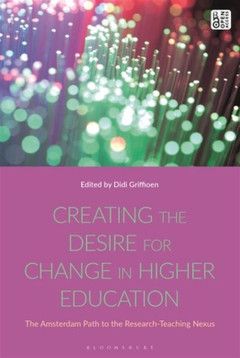
Creating The Desire Of Change In Higher Education
This open-access, evidence-informed volume explores strategies for fostering institutional change in higher education by strengthening the integration of research and teaching. Drawing on international scholarship and the Amsterdam model, editors and contributors present pathways toward sustainable “hybrid” institutions where both research and education are deeply intertwined.
- Edition
- -
- ISBN/ISSN
- 978-1-3502-4478-8
- Collation
- 233 page
- Series Title
- -
- Call Number
- 378
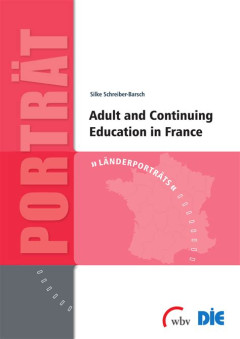
Adult and Continuing Education in France
This open-access study offers a comprehensive overview of adult and vocational education in France. Tracing its historical foundations, it examines key political, legal, and financial frameworks, along with institutional structures, program offerings, participation trends, and characteristics of teaching staff.
- Edition
- -
- ISBN/ISSN
- 978-3-7639-5612-8
- Collation
- 90 page
- Series Title
- -
- Call Number
- 374
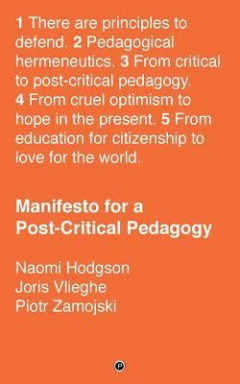
Manifesting For A Post-Critical Pedagogy
This manifesto critiques the conventional critical pedagogy’s focus on revealing injustice and striving for an ideal future. Instead, it proposes an affirmative, present-focused pedagogy rooted in five core principles. These principles encourage educators and researchers to recognize and nurture what is already educational in current practices—anchored in love for the world and hope in the …
- Edition
- -
- ISBN/ISSN
- 978-1-947447-39-4
- Collation
- 112 page
- Series Title
- -
- Call Number
- 370.115
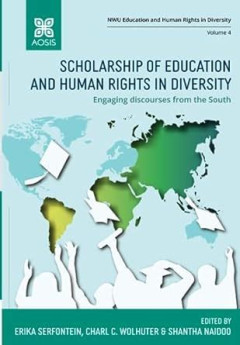
Scholarship of education and human rights in diversity
This open-access volume foregrounds the intersections of education, human rights, and diversity from a Global South vantage point. Edited by Serfontein, Wolhuter, and Naidoo, it critiques Western-dominated perspectives and reframes scholarship through African and SADC-region lenses. Chapters unpack themes such as citizenship education, human rights literacies, pedagogical approaches, school dis…
- Edition
- Volume 4
- ISBN/ISSN
- 978-1-77995-247-9
- Collation
- 318 page
- Series Title
- -
- Call Number
- 370
 Computer Science, Information & General Works
Computer Science, Information & General Works  Philosophy & Psychology
Philosophy & Psychology  Religion
Religion  Social Sciences
Social Sciences  Language
Language  Pure Science
Pure Science  Applied Sciences
Applied Sciences  Art & Recreation
Art & Recreation  Literature
Literature  History & Geography
History & Geography